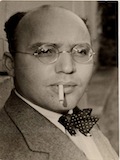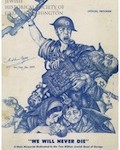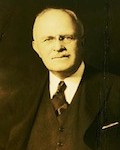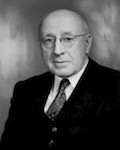Internationally renowned composer Kurt Weill (1900-1950), exiled from Nazi Germany, used his talents to promote rescue of refugees and Jewish statehood.
Weill, who is best remembered for such classics as his collaboration with playwright Bertolt Brecht on “The Threepenny Opera,” was denounced as a “degenerate” by the new Nazi regime in 1933. He fled to France, then settled in the United States in 1935. Weill closely followed events in Germany, particularly the escalating persecution of German Jews in the late 1930s and early 1940s. Deeply wounded at the mistreatment of his coreligionists, Weill refused to ever speak German again, and was upset when Life referred to him as a “German composer.”
In the autumn of 1941, Weill volunteered to compose the music for “Fun to Be Free,” a political rally and theatrical revue that Ben Hecht staged before a packed house of 17,000-plus at Madison Square Garden. The performers and speakers included Carmen Miranda, Jack Benny, Tallulah Bankhead, and the inimitable manager of the Brooklyn Dodgers, Leo Durocher, among many others. They urged America to launch a pre-emptive war against Nazi Germany as the only way to preserve world peace.
By early 1943, the Allies had confirmed the news of Hitler’s mass murder of Jews in Europe. Hecht decided to convene a meeting in New York City of thirty playwrights, novelists, and other cultural luminaries, including Weill. “I felt certain that if we banded together and let loose our talents and our moral passion against the Germans, we might halt the massacre,” Hecht later recalled. “How they could dramatize the German crime! How loudly they could present the nightmare to America and the world!” But when Hecht asked his guests to join him in organizing protests, only two of the thirty stepped forward. One was the director Moss Hart. The other was Weill. “Please count on me for everything,” he told Hecht.
Within weeks, Hecht had written a dramatic pageant for the Bergson Group called “We Will Never Die,” to publicize the Nazi mass murders and appeal for Allied intervention. Weill composed the musical score for the pageant, and members of the NBC orchestra performed it. Weill’s score provided the thematic power and mood that helped bring Hecht’s script to life.
In the summer of 1946, Hecht wrote a play called “A Flag is Born,” about the plight of Holocaust survivors and the need for a Jewish State. Hecht noted that while some of his other colleagues in the struggle had by then “melted away,” Weill was the exception– “My composer friend was unmeltable.” Weill contributed what the New York Times called “a beautiful theatre score.”
Sources: Wyman, The Abandonment of the Jews, p.90; Baumel, The “Bergson Boys,” p.114.











